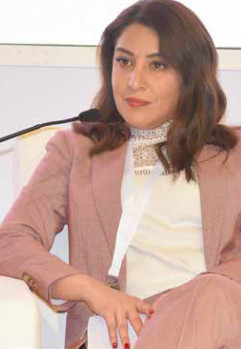Dima Najm: UAE is a Pioneer in Connecting Education with the SDGs
Good education contributes to the empowerment of mankind. It expands people’s intellectual horizons that help in innovation, creativity and the advancement of societies in all fields. It also plays a fundamental role in reducing unemployment rates.
Dima Najm, Managing Director of Education for Employment in the UAE, spoke to Flashes magazine’s Randa Gerges about the global unemployment challenge and how principles of sustainability can be integrated into education and training curricula to benefit new graduates as they enter the job market.
What are the major hurdles to the attainment of sustainable development goals (SDGs) in the
education sector?
The outstanding challenges we face in the Education for Employment (EFE) Foundation is the suffering of university graduates due to lack of jobs suitable to their skills. Some studies have confirmed that 50% of the technical skills that a student acquires in the first year in college do not benefit them in their practical life. Therefore, we need to pay attention to the training aspect, focus on the requirements of the labor market, and strengthen the bond between employees and people who can make these young people more qualified in securing jobs after graduation.
How can the challenges affecting the performance of education institutions be solved?
We must first believe that knowledge is the foundation of building life. Then, we need to define the problems related to education so that we can agree on how to accelerate our efforts and eliminate the challenges that set back the performance of educational institutions. We have to work on achieving high quality education to completely get rid of the problem of unemployment in the MENA [Middle East and North Africa] region. We also need to train well qualified young people to enter the labor market with the relevant skills.
Some statistics indicate that the unemployment rate in MENA reached an average of 18 million young people in 2015. The numbers are projected to reach 38 million in 2030. The reason for this is the graduation of students from universities without adequate skills to help them find suitable opportunities. Therefore, institutions must focus on these young people to match their training with the skills required in the labor market.
What are the solutions that can support the role of education in creating jobs for young people?
The most effective solutions lie in the ability to link education with sustainable development, by changing existing curricula and working to develop new educational materials at all levels from elementary to university level, and to align them with the sustainable development goals. Education institutions should be an area for discovering the energies and talents of the students. The UAE is one of the leading countries regionally and globally in this field, especially with regard to renewable energy, education, providing an enabling environment for young people. It is also a leader in establishing conferences, programs and platforms that promote the renewal of ideas, innovation and thinking outside the box, and come up with recommendations that make a difference on all sides.
How can the curricula be developed to teach new generations?
A plan must be devised to introduce the child to sustainable development from the formative stages since knowledge is primarily transmitted through individuals, and a child in the early years relies on imitating the actions of those around him. Therefore, it is the responsibility of schools to take care of everything that relates to sustainable development – be it water, lighting, heating, general hygiene and other community services that must be available to humans.
We must look at the way we deal with children. For example, in most cases, we assign young children many t asks a nd w ait f or t hem t o d o t hem t o t he fullest, and the child is evaluated according to these standards, although these standards are not related to the issues of the 21st century. Here we must pay attention to the features of this century and depend on the creators who are able to communicate their ideas in modern and innovative ways, have successful methods in dealing with others, and find solutions to the challenges and problems facing the world.
What are your future plans in the field of education and employment?
Future plans in EFE Foundation depend on many aspects. We are currently strengthening and increasing our partnerships with local and regional governments and institutions located in MENA so that we reach the largest number of Arab youth, and provide them with the right ways to fit within the job market. We wish to reach our partners who are interested in education for employment, especially as the unemployment rate in MENA reaches 28%. I emphasize that cooperation supports achieving goals in a manner useful for all, and qualifying young people in a professional way to enter the labor market could achieve a high rate of excellence and success in projects across all fields.








